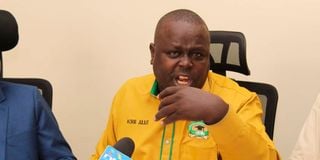Unions call out TSC as JSS teachers yet to be paid since January

Kenya Union of Post Primary Education Teachers Vice-Chairman Julius Korir.
Junior Secondary School (JSS) teachers recruited by the Teachers Service Commission (TSC) in January have not been paid for the past four months.
The Kenya National Union of Teachers (Knut) and the Kenya Union of Post Primary Education Teachers (Kuppet) have called on the TSC to release the salaries to enable the affected teachers to meet their financial needs.
The TSC recruited 35,500 teachers in January and another 30,000 are expected to be hired on permanent and pensionable terms in the next financial year (2023/2024).
Kuppet national vice-president Julius Korir, national deputy treasurer Ronald Tonui, secondary education secretary Henry Obwocha, National Governing Council member Paul Kimetto and Knut National Executive Council members Malel Langat, Richard Lentayaa, Eliud Ombori, Maurice Challenga and Malindi branch secretary Moses Mramba separately asked TSC to pay the affected teachers.
Mr Tonui told the Nation in a telephone interview from South Africa that some teachers had only received one month's salary instead of three months' dues as has been the tradition.
“Teachers, like any other workers, have family and personal financial obligations to meet. The TSC should address this matter immediately,” Mr Tonui said.
Mr Tonui said the delay had demoralised teachers and aggravating the fragile situation in JSS.
“Some of the teachers have had their houses locked by landlords, others are unable to pay the fare to and from their stations, a large number of them are unable to meet their family medical expenses. All this has resulted in psychological torture,” Mr Langat said yesterday.
“It is unfortunate that some of the teachers are at the mercy of shylocks and loan sharks,” added Mr Langat, who is also the Bomet Knut executive secretary.
Mr Obwocha noted that most JSS teachers work far from their homes and that there are no teachers' quarters in their work stations.
"They are forced to live in structures that have no water, electricity and proper sanitation. Some schools have mud houses for the teachers," Mr Obwocha said.
Mr Kimetto said many of the teachers could not raise money for fare, food and other basic needs.
“They also have to teach more than two subjects, what with a maximum of three teachers in one institution teaching 14 subjects,” said Mr Kimetto, who is also the Bomet Kuppet branch secretary.
“The teachers are suffering but the employer has not addressed their plight despite repeated appeals from the unions. This is not just a labour issue, it is a human rights issue,” Mr Korir said.
“The teachers are in their fifth month without pay and there is no guarantee that they will be paid by the end of this month (May),” said Mr Omburi, the Rachuonya Knut branch secretary.
TSC chief executive officer Nancy Macharia admitted earlier this month that half of the teachers who were recruited in January had been paid part of their salaries, while the rest were still to be paid.
“We apologise for any delays that may have been caused by late reporting of teachers to their stations or late submission of required documents,” a statement from the commission said.





